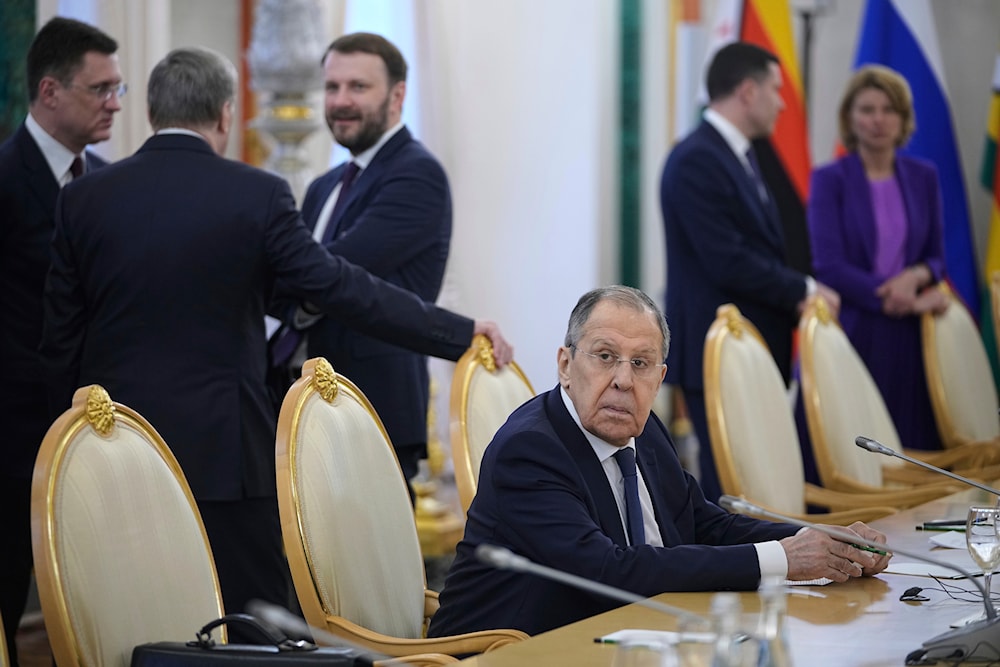Russia prepares Ukraine peace memo addressing war’s root causes
Moscow suggests Ukrainian elections may be needed to determine a legitimate peace deal signatory, while the Kremlin accuses Kiev of striking civilian sites.
-

Russian Foreign Minister Sergey Lavrov in the Grand Palace at the Kremlin in Moscow, Russia, on Saturday, May 10, 2025 (AP)
Russia is preparing a comprehensive memorandum on Ukraine aimed at addressing the fundamental causes of the ongoing conflict, Foreign Minister Sergey Lavrov confirmed on Friday.
The announcement came during the conference Historical South Russian Lands, National Identity and Self-determination of Peoples, where Lavrov emphasized that a sustainable resolution must begin with confronting what he described as the war’s underlying “tumor".
“The memorandum that we agreed to work out and hand over to the Ukrainians… [is] based on the most fundamental things and based on what root causes underlie this conflict and how these root causes, like a tumor, must be removed,” Lavrov stated.
He added that the document, still in preparation, would aim to initiate a serious dialogue on how to dismantle the structures and ideologies he believes are at the heart of the Russia-Ukraine confrontation.
When questioned about who could legitimately sign a future peace deal on behalf of Ukraine, Lavrov suggested that elections may be the most appropriate mechanism.
“And then we will see who has legitimacy among the Ukrainian authorities,” he said, noting that while Ukraine’s constitution might allow for the speaker of the Verkhovna Rada to assume the role, “probably the best option would be to hold elections.”
No venue yet for renewed Russia-Ukraine negotiations
Kremlin spokesperson Dmitry Peskov told reporters that no agreement has been reached regarding the venue for potential future peace talks with Ukraine.
“No, there are no decisions or agreements yet on the next venue for negotiations,” Peskov said, adding that such a decision will be made “when the time comes.”
Asked about the extent of a potential buffer zone along the Russia-Ukraine border, Peskov directed questions to the Ministry of Defense, stating that such matters fall under operational military considerations.
“This directly concerns the course of hostilities, military specifics, so I recommend that you address this issue to the Ministry of Defense,” he added.
Kremlin accuses Kiev of attacking civilian infrastructure
Peskov also condemned Ukraine’s military operations, accusing Kiev of targeting civilian infrastructure and non-combatants.
“The Kiev regime continues its hostile actions… Attacks on peaceful facilities and social infrastructure… The Kiev regime retains its essence in this case,” he said, reinforcing the Kremlin’s long-standing narrative of Ukrainian aggression.
Separately, Peskov commented on the European Union’s internal disputes, particularly the upcoming hearing on whether to suspend Hungary’s voting rights over its political alignment with Moscow.
“There is a certain EU, European mainstream, which, let’s say, is absolutely not liked by a number of European countries that are supporters of a more independent policy,” Peskov observed.
Attempts to penalize Hungary, he added, were “evidence of growing contradictions within the bloc.”
Read next: Hungary diverges from EU by proposing Ukraine as a 'buffer zone': FT

 3 Min Read
3 Min Read









